
Dr Christine Dufès
Senior Lecturer
RW 501L
Tel : +44(0)141 548 3796 (Ext. 3796)
RESEARCH INTERESTS
• Design and development of novel targeted anti-cancer therapeutic systems
• Design and development of novel therapeutic systems able to reach the brain after intravenous administration, with the ultimate aim to facilitate drug delivery to brain tumours and neurogenerative disorders.
RESEARCH HIGHLIGHTS
Independent work:
Podcast about recent research results:
http://www.youtube.com/embed/JhbIoXsAM7M
• Tumour regression after intravenous administration of a tumour-targeted dendrimer combined with a therapeutic plasmid (complete disappearance of 90% of the tumours)(Figures 1 and 2). These results are highly important, as there is currently no gene medicine commercially available for the intravenous treatment of cancer. This work was published in Journal of Controlled Release (JCR), made the cover and the editorial of the journal. The Editor of JCR described these results as being “highly remarkable and interesting”, concluding that “for now Dr. Dufès seems to be at the forefront of achieving such a goal” (talking about clinical trials). This work led to wide international press coverage.
Press release: http://www.strath.ac.uk/press/newsreleases/2010/headline_398684_en.html
It was also the object of a commentary in Strathclyde People Magazine (with cover):
http://whitelightmedia.ceros.com/strath/spring2012/page/1
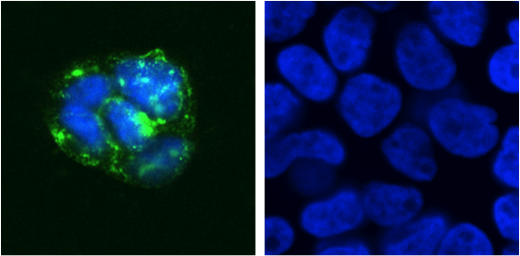
Figure 1: Confocal microscopy imaging of fluorescently-labelled DNA, either complexed with a tumour-targeted dendrimer (left) or free in solution (right), after incubation for 24 hours in T98G glioma cancer cells (Blue: Nuclei stained with DAPI, green: fluorescently-labelled DNA) (Koppu et al., 2010).
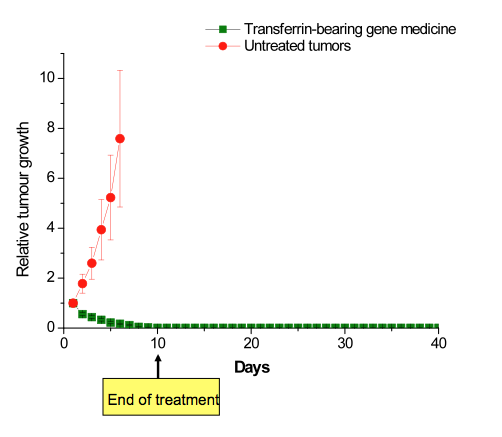
Figure 2: Tumour regression in a xenograft model after intravenous administration of transferrin-bearing gene medicine (green). (Control: untreated tumours(red)) (Koppu et al., 2010).
• Tumour regression after intravenous administration of the vitamin E extract tocotrienol entrapped in tumour-targeted vesicles (complete disappearance of 40% of the melanoma tumours)(doctoral work of Ms Ju Yen Fu)(Figure 3).This work corresponds to the first preparation of a tumour-targeted delivery system able to encapsulate tocotrienol. It is the first time that a tocotrienol formulation can lead to tumour suppression. This work was the object of wide international press coverage, led to 2 publications in JCR. The last publication was mentioned in the editorial as showing “highly efficient tumoricidal activity” and “further research […] is expected to bring a new dimension to targeted drug delivery”.This publication was chosen as the manuscript to discuss at a workshop during the 38th annual meeting of the Controlled Release Society (National Harbour, Maryland, USA) (August 2011).
Press release: http://www.strath.ac.uk/press/newsreleases/2009/headline_225652_en.html

Figure 3: Confocal microscopy imaging of the cellular uptake of tocotrienol, either entrapped in tumour-targeted vesicles or free in solution, after incubation for 4 hours in A431 cancer cells (Red: Nuclei stained with propidium iodide, blue: tocotrienol) (Fu et al., 2009).
• Tumour regression after intravenous administration of a novel tumour-targeted polypropylenimine dendrimer combined with p73 expression plasmid, with complete disappearance of 10% of the tested tumours and long-term survival of the animals (Figure 4). It is the first time that a tumour-targeted p73 could lead to tumour suppression after intravenous administration. This work was published in Biomaterials.
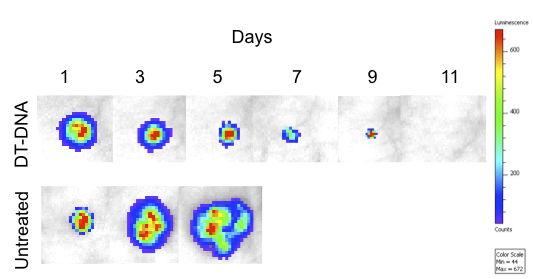
Figure 4: Bioluminescence imaging of the anti-tumoral activity of the tumour-targeted-polypropylenimine dendrimer combined with p73 expression plasmid in a B16-F10-luc melanoma tumor model (Control: untreated tumours) (Lemarié et al., 2012)
• Regression of prostate tumours after intravenous administration of a tumour-targeted polypropylenimine dendrimer combined with either TNFα, TRAIL and IL-12 expression plasmids, with complete disappearance of up to 60% of PC-3 tumours and up to 50% of DU145 tumours (doctoral work of Mr Majed Al Robaian).
• Tumour regression after intravenous administration of the green tea extract epigallocatechin gallate encapsulated in tumour-targeted vesicles (complete disappearance of 40% of the tumours for both tested tumour types). It is the first time that a green tea extract was shown to have an anti-cancer therapeutic effect. This work was the subject of wide press coverage, including an interview by the Japanese Fuji TV.
(Press release:http://www.strath.ac.uk/press/newsreleases/2012/headline_648791_en.html)
• Increase of gene expression in tumours by surface modification of polyethylenimine and polypropylenimine polymers with the amino acids arginine, lysine and leucine (doctoral work of Ms Hibah Aldawsari)(Figure 5).This work was published in Biomaterials and Nanomedicine: Nanotechnology, Biology and Medicine. It led to an invited publication with cover, in the newsletter of the Controlled Release Society, and to an article on The Wellcome Trust Blog.
http://wellcometrust.wordpress.com/2011/11/30/a-dab-hand-at-dna-delivery/
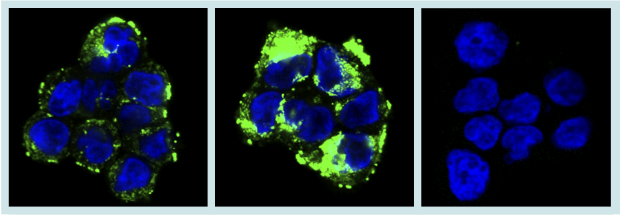
Figure 5: Confocal microscopy imaging of the cellular uptake of fluorescently-labelled DNA either complexed with polypropylenimine dendrimer bearing arginine (left) or lysine (middle) after incubation for 24 hours with A431 epidermoid carcinoma cells (control: DNA solution (right) (Blue: Nuclei stained with DAPI, green: fluorescently-labelled DNA)(Aldawsari et al., 2011).
• Increase of gene expression in the brain following intravenous injection of transferrin-bearing dendriplex (at least twice higher than that of the unmodified dendriplex), while decreasing the non-specific gene expression in the lung. Gene expression was at least 3-fold higher in the brain than in any tested peripheral organs (doctoral work of Mr Sukrut Somani).
Collaborative work:
• Tumour regression in vivo using systemically active synthetic vectors to express a novel p53-derived apoptotic peptide able to de-repress p73 (post-doctoral work, PI: Prof. K. Ryan, Dr A. Schätzlein). This work was the object of a commentary in Science's special issue about cancer research.
http://www.sciencemag.org/content/331/6024/1551.full
Access to PubMed for full text of publications: http://www.ncbi.nlm.nih.gov/pubmed/?term=Dufes
Access to KnowledgeBase for all research activities: https://pure.strath.ac.uk/portal/en/persons/christine-dufes(9f85f535-3d56-4406-9278-d5156b4710ad)/activities.html
Presentation of Christine Dufès’ research as “Talent des Deux-Sèvres” in Le Courrier de l’Ouest:
- In 17th July 2013 edition:http://www.courrierdelouest.fr/actualite/bressuire-enseignant-chercheur-a-glasgow-16-07-2013-114487
- In 21st July 2014 edition:http://journal.courrierdelouest.fr/?utm_source=cofr&utm_medium=lien&utm_campaign=co-journal_filrouge&utm_content=barredenav
CURRENT GROUP MEMBERS
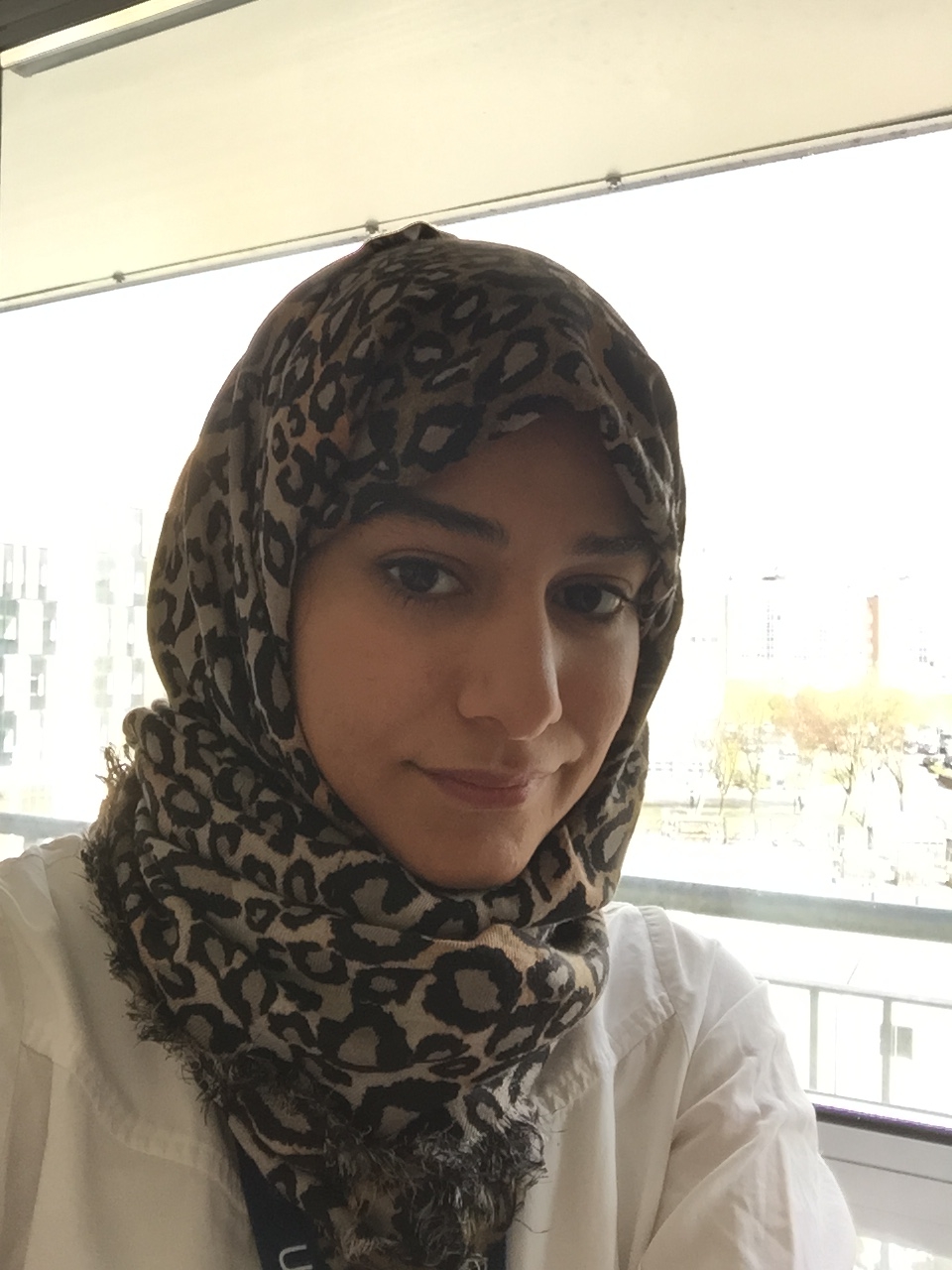 |
• Mrs Najla Altwaijry (PhD student) Mrs Najla Altwaijry is a PhD student. She received her B.Pharm from King Saud University (Saudi Arabia, 2009) and her M.Sc in Pharmaceutical Sciences from the University of Strathclyde (2014). She worked in an hospital for 2 years before becoming teaching assistant at the School of Pharmacy, Princess Noura University. She joined the group in 2015 and now works on the development of new gene delivery systems for prostate cancer therapy.
|
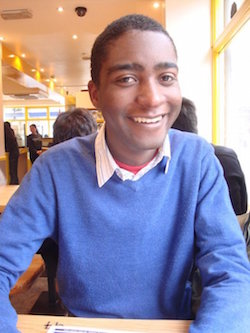 |
• Mr Stephen Amoah-Nyako (MRes student) Mr Stephen Amoah-Nyako obtained his MPharm from King's College London (University of London) in 2009. He then completed his pre-registration trainee year at the Oxford Radcliffe Hospitals (now Oxford University Hospitals) before starting work as a hospital pharmacist at the Royal United Hospital Bath. It was during his rotations in haematology, oncology and the aseptic unit, where Stephen began to develop an interest in the emerging therapies for cancer treatment which motivated him to pursue a MRes in Drug Delivery Systems at the University of Strathclyde. He joined the group in 2014 and is looking into the development of novel tumour-targeted nanomedicines for cancer therapy.
|
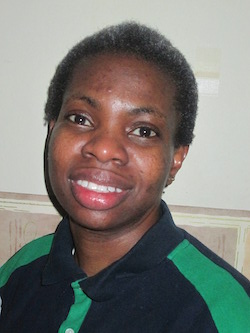 |
• Mrs Joan Onyebuchi Erebor (PhD student) Mrs Joan Onyebuchi Erebor is a PhD student. She obtained a B.Pharm from the Faculty of Pharmacy, University of Benin, Nigeria, in 2000 and an MPhil in Pharmaceutics and Pharmaceutical Technology at the Faculty of Pharmacy, University of Benin, in 2013. She worked in industry for Neimeth International Pharmaceuticals PLC in Nigeria for 2 years and obtained a prize in product marketing. She became an assistant lecturer in the University of Benin in 2011. She joined the group in 2014 and now works on the development of targeted nanomedicines for cancer therapy. |
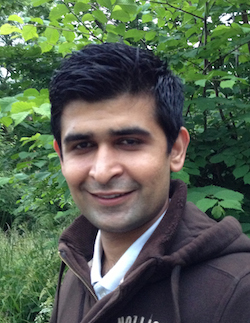 |
Mr Sukrut Somani is a research assistant/PhD student. He obtained his B.Pharm (with Distinction) from Institute of Pharmacy, Nirma University, India, in 2010. He then joined The School of Pharmacy, University of London (now UCL School of Pharmacy) for higher studies and got an MSc in Drug delivery in 2011. As an undergraduate student, he obtained three top prizes for oral presentations on nanomedicine at national and international symposia in India. He joined the group in 2012 and now works on the development of new gene delivery systems for brain targeting.
|
ALUMNI (POSTGRADUATE STUDENTS)
• Mr Behin Sundara Raj (MPhil, 2008), is a Lecturer in Pharmaceutics at the Shree Devi College of Pharmacy, Mangalore (India).
• Dr Ju Yen Fu (PhD, 2010) is a Researcher for the Malaysian Palm Oil Board (Malaysia).
• Dr Hibah Aldawsari (PhD, 2011) is Assistant Professor of Pharmaceutics and Vice-Dean of Faculty of Pharmacy- Female Section at King Abdulaziz University (Saudi Arabia).
• Mr Reatul Karim (MRes, 2013) is a Senior Lecturer at the Department of Pharmacy at State University of Bangladesh (Bangladesh).
• Mr Majed Al Robaian (PhD, 2014) is a lecturer at the School of Pharmacy, Taif University (Saudi Arabia).
RESEARCH OPPORTUNITIES
For further information regarding the research opportunities within the group, either at PhD or post-doctoral level, please contact Dr Christine Dufès (C.Dufes@strath.ac.uk)
AWARDS
To Christine Dufès:
• National Bourse d’ Excellence Lavoisier, French Ministry of Foreign Affairs (2002)
• First Prize Award of the 9th Annual Symposium of the United Kingdom and Ireland Controlled Release Society (January 2003, Belfast)
• First Prize Award of the 13th Tenovus Scotland Symposium (the Biochemical Journal Young Investigator Award) (April 2009, Glasgow)
• Tom Gibson Memorial Award 2012 (September 2012, Glasgow)
The prize is awarded to recognise outstanding accomplishment and/or outstanding potential of young researchers involved in multidisciplinary research activity oriented towards enhancing developments in medicine and/or in its related sciences and technologies. The award is made biannually by the Royal College of Physicians and Surgeons of Glasgow and the British Association of Plastic, Reconstructive and Aesthetic Surgeons, in association with the universities of Glasgow and Strathclyde.
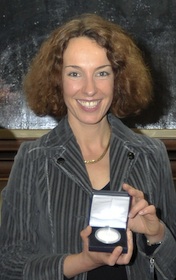
• "Best Overall" Strathclyde Teaching Excellence Award 2013 (May 2013, Glasgow), following nominations in all categories ("Most enthusiastic", Most supportive" and Most innovative").
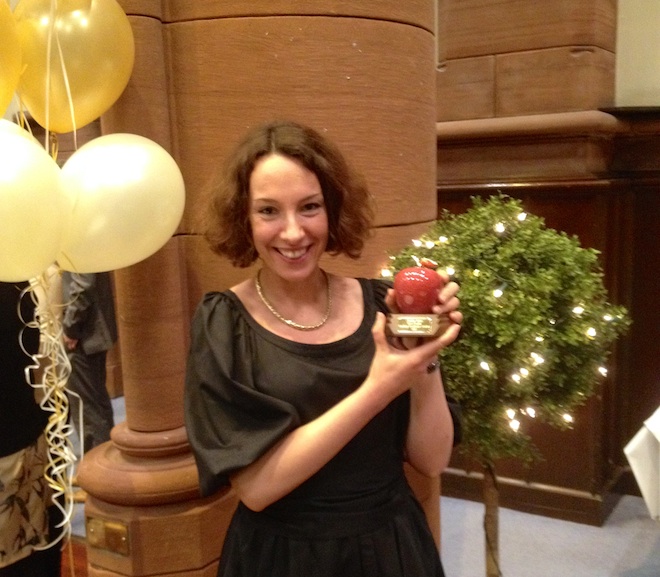
To members of the laboratory:
• Award of the First year PhD students’ presentations to Ms Ju Yen Fu (PhD student) at the BCDD Research Day (June 2008)
• Outstanding Poster Award of the 3rd Saudi International Conference to Mrs Hibah Aldawsari (PhD student) (June 2009, Guildford)
• Award of a Second Year PhD students’ presentations prize to Mrs Hibah Aldawsari (PhD student) at the BCDD Research Day (June 2009)
• Award to Mrs Hibah Aldawsari (PhD student) at the First Academic Forum for Saudi Female Students in the UK and Ireland (March 2010, Sheffield)
• Runner-up Award for Scotland to Mrs Hibah Aldawsari (PhD student) at the British Council’s Shine! International Student Competition (March 2011, London). She was selected from more than 1200 students nationwide.
(Press release: http://www.strath.ac.uk/press/newsreleases/2011/headline_401846_en.html)
• Award of the 5th Saudi International Conference to Mrs Hibah Aldawsari (PhD student) (June 2011, Coventry)
• Mention of Majed Al Robaian on the Distinction Board of the UK Saudi Cultural Bureau, which highlights the achievements of 109 top Saudi students in the UK. Majed was selected among 14 460 Saudi students nationwide (November 2013).
• Award of the 8th Saudi International Conference to Mr Majed Al Robaian (PhD student) (February 2014, Edinburgh)
• Best Poster Award of the Nanomedicine Conference to Mr Sukrut Somani (PhD student) (March 2014, Edinburgh)
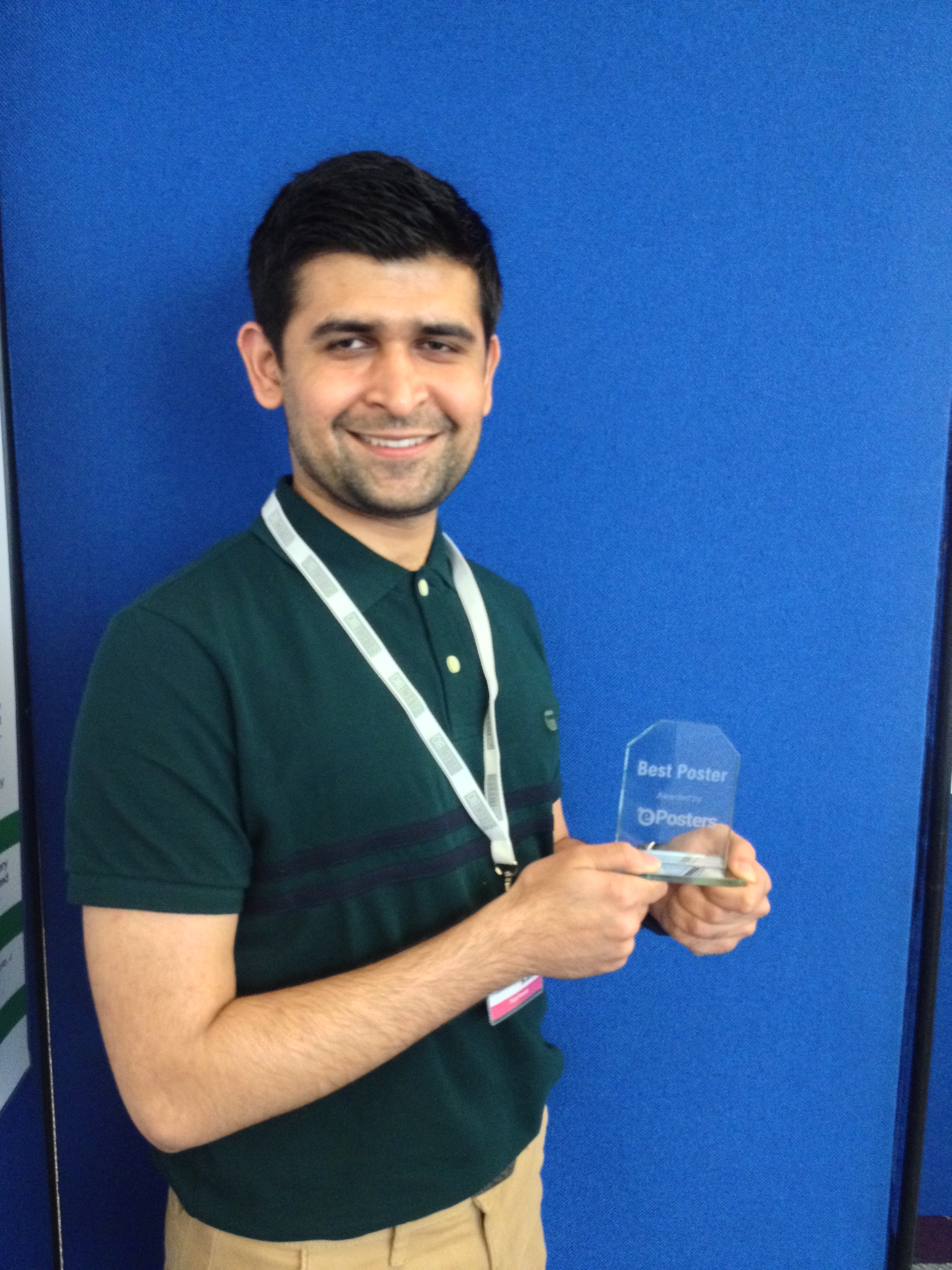
• SIPBS Travel Award to Mr Sukrut Somani (PhD student) (May 2014, Glasgow)
• PGR Travel Award to Mr Sukrut Somani (PhD student) (May 2014, Glasgow)
• Distinction prize for Saudi students in the UK to Mr Majed Al Robaian (PhD student) (September 2014, Royal Embassy of Saudi Arabia, London)
PUBLIC ENGAGEMENTS
• Christine Dufès presented her Tenovus Scotland-funded work to HRH The Princess Royal during her visit to Tenovus Scotland (February 2009)

• Christine Dufès presented her research work to HRH The Princess Royal and to senior school pupils at the Medical Research Scotland "Meet the Researcher Showcase" (March 2010)

(Photo by Don Clements, photographer, http://www.donclementsimages.co.uk/)
• Christine Dufès presented her recent research work to HRH The Princess Royal during her visit to Tenovus Scotland (October 2012)
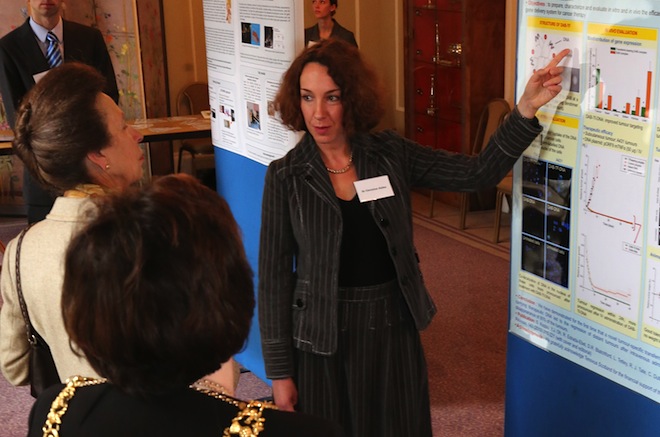
• Sukrut Somani and Christine Dufès were involved in the Strathclyde’s "Really Small Science" nanobioengineering public engagement event that took place from Thursday 17th October until Sunday 20th October 2013 as part of the Glasgow Science Centre’s "Bodyworks" exhibition. Their "Cancer targeting" dart game attracted 1037 people (553 children and 484 adults).
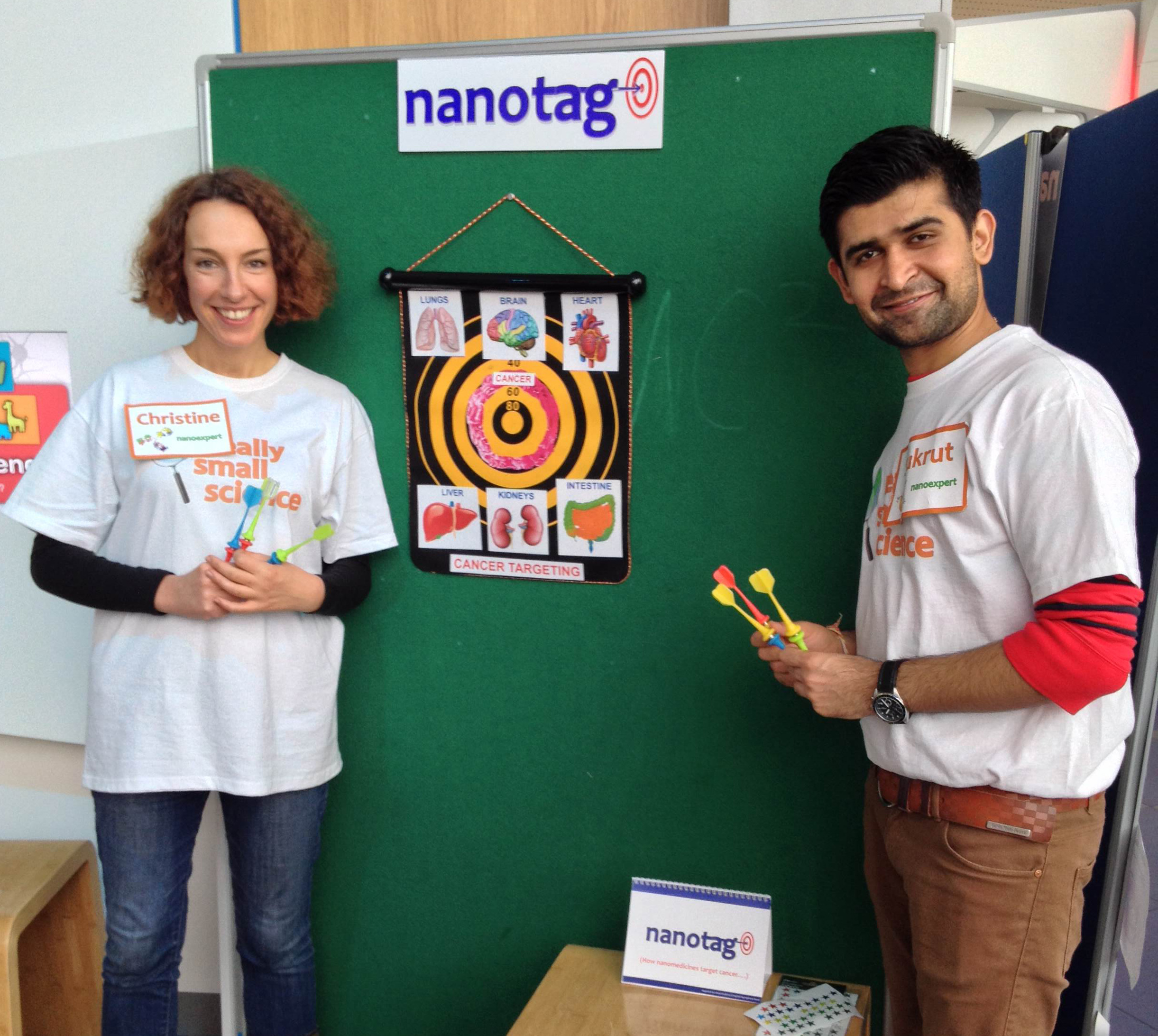
• Christine Dufès participated in the debate on Personal Genome Project UK organized by the Strathclyde Debates Society on 27th November 2013.
• Christine Dufès was invited to give a talk (“Green “tea-rapy: a new weapon against cancer”) at “Techfest in September” (Aberdeen and North-East Scotland’s Festival of Science, Technology, Engineering & Mathematics) in Aberdeen, on 25th September 2014.
Programme of "TechFest in September 2014": http://www.techfestsetpoint.org.uk/tis/public/
Selected Publications